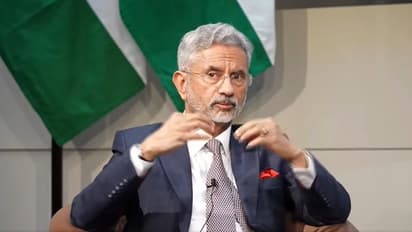'Situation relatively improved': EAM Jaishankar on resumption of e-visas in Canada

Synopsis
Jaishankar explained the temporary suspension of visa issuance, citing the challenging situation in Canada that hindered the work of Indian diplomats. As conditions in Canada improved, making it relatively more secure, India gradually reinstated visa services.
Amidst the India-Canada diplomatic tensions, External Affairs Minister S Jaishankar highlighted the resumption of e-visa services in Canada, citing an improvement in the situation as the primary reason. Speaking following the conclusion of the Virtual G20 Leaders' Summit, Jaishankar clarified that the G20 meeting played no role in this decision.
Jaishankar explained the temporary suspension of visa issuance, citing the challenging situation in Canada that hindered the work of Indian diplomats. As conditions in Canada improved, making it relatively more secure, India gradually reinstated visa services.
"At the time when physical visas began issuance in various categories, we indicated the consideration of e-visas next. Hence, it's a natural progression," Jaishankar affirmed.
Starting November 22, the Indian eVisa facility reopened for eligible Canadian citizens holding regular/ordinary Canadian passports. This move followed India's earlier resumption of entry visas, business visas, medical visas, and conference visas on October 26, a month after the suspension.
The diplomatic strain between India and Canada heightened in September when Canadian Prime Minister Justin Trudeau implicated Indian involvement in the murder of Hardeep Singh Nijjar, a figure designated as a terrorist by India. Despite Canada claiming to possess evidence, India refuted having received any such proof and urged for its submission.
Silkyara tunnel rescue operation in last stage; Rescuers draw closer to 41 trapped workers
In the escalating tensions, both nations expelled a senior diplomat each. India halted its visa services in Canada and demanded the withdrawal of 41 diplomats stationed in India, accusing them of meddling in India's internal affairs.
Stay updated with the Breaking News Today and Latest News from across India and around the world. Get real-time updates, in-depth analysis, and comprehensive coverage of India News, World News, Indian Defence News, Kerala News, and Karnataka News. From politics to current affairs, follow every major story as it unfolds. Get real-time updates from IMD on major cities weather forecasts, including Rain alerts, Cyclone warnings, and temperature trends. Download the Asianet News Official App from the Android Play Store and iPhone App Store for accurate and timely news updates anytime, anywhere.